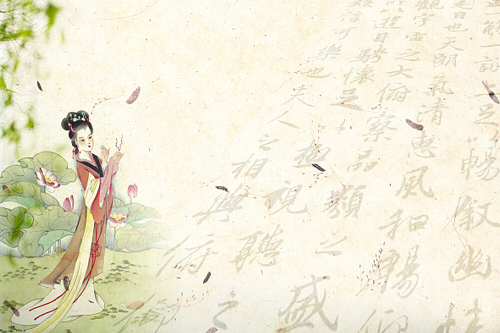《浮生六记》英译阅读与讨论(二)
文/刘士聪
【原文】其形削肩长项,瘦不露骨,眉弯目秀,顾盼神飞,唯两齿微露,似非佳相。一种缠绵之态,令人之意也消。
【译文】The simplicity of her robe seemed to accentuate her fragile beauty andthe slenderness of her graceful figure, with its sloping shoulders and long, delicateneck. Her eyes looked very dark beneath the curving wings of her brows. Her glance sparkled with intelligence and humour, and I could find no flaw in her loveliness except that her two front teeth sloped forward ever so slightly under short upper lip; an unimportant defect, but one that was regarded as a sign of bad luck. Above all else,a clinging softness in her manner, an indefinable air of tenderness and vulnerabilityabout her, touched my heart deeply, making me wish to stay forever by her side. (p. 5)
【简评】“The simplicity of her robe seemed to accentuate...”系前文“her quiet, simple self ”的补充文字,用来描写芸的fragile beauty and the slendernessof her graceful figure,句中的accentuate是关键动词,突显芸的弱姿与苗条,译者联系上下文,创造了一个颇具美感的形象。

“顾盼神飞”译文与霍译《红楼梦》中译文相似,在第一部分里说过,都用了 glance、glances 和 sparkle。
“缠绵之态”,意为“婉转动人”,可以说“歌声柔和缠绵”;用来描写人的行为举止或仪态时,“缠绵”是什么样子、怎么翻译,是个问题。译者根据她的理解和想象将其译作,“a clinging softness in her manner, an indefinableair of tenderness and vulnerability about her”,其中 a clinging softness 是对“缠绵”的成功传译。关于to cling,这里指“情感上的依恋”。从作者对她的情感看,这个译文应该说是很好的,说出了原文的内含。为什么译者用了vulnerability,在那个时代的女性对男性的依恋之中,可能指情感的“脆弱”,或易受伤害的因素,若是出于这种考虑,也说明译者思维的缜密。另,“两齿微露”译文里补充了under short upper lip,这一补充可有可无,对再现芸的形象未必有益。
关于“令人之意也消”,淮茗在其《浮生六记》注释本(中州古籍出版社,2010)中有解释:“让人萌生爱恋之意,难以割舍”,即放不下、忘不掉。译文making me wish to stay forever by her side,有“难以割舍”之意。
【原文】……悄然入室,伴妪盹于床下,芸卸妆尚未卧,高烧银烛,低垂粉颈,不知观何书而出神若此……
【译文】Quietly I entered my bridal chamber, where the bride’s attendant lay dozing on the floor. Yuen, who had taken off her wedding finery, was not yet in bed. She was sitting, in the light from a pair of tall silver candles, with her delicate white neck bent over a book, so completely absorbed in her reading that she was unaware that I had come into the room. (p. 8)
【简评】这段文字刻画芸忘记新婚之欢、埋头读书的形象,译文与原文有异曲同工之妙,尤其是将“高烧银烛“译作在烛光之下,in the light from a pair of tall silver candles,“低垂粉颈”不但译了埋头读书,也译了her delicate white neck,二者构成一个状语,描画了芸在烛光之下忘情读书的优雅姿态,形象之鲜明,有原文审美效果,属经典译句。
好的作家和译家追求文字之美。有人说,写句子是艺术,这个说法有道理。英国作家毛姆(W. Somerset Maugham)在他的文章 Lucidity 里说:Words have weight, sound and appearance; it is only by considering these that you can write a sentence that is good to look at and good to listen to.他要求写句子既要好听又要好看。这是他对英语句子的感悟。
这个译句不仅听着好、看着好,意境也好。
【原文】芸作新妇,初甚缄默,终日无怒容,与之言,微笑而已。事上以敬,处下以和,井井然未尝稍失。
【译文】Though she was at first reserved and silent, Yuen, as a young bride, was never angry nor sullen. She was respectful to her elders and treated her inferiors with gentle kindness, nor could the slightest fault be found with the work she did in the household. (p. 9)
【简评】“缄默”译文用了两个词,reserved and silent;“怒容“译文也用了两个词,never angry nor sullen。这样译可能有两方面考虑,第一,为避免片面,把可能的情况都点到,将“缄默“译作 reserved and silent,指初为人妇的谨慎和少言少语,将“无怒容”译作 never angry nor sullen,指既不生气,也没有乖僻性格的表现;第二,可能也考虑了句子的平衡与节奏,若二者只取其一,读起来难免有突兀之感。
“井井然未尝稍失”,井然有序和不曾出错,侧重译了“未尝稍失”,包括了前者的意思。








